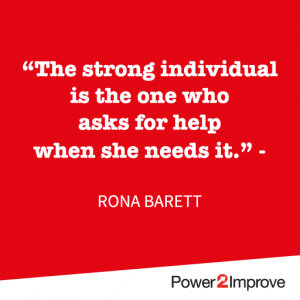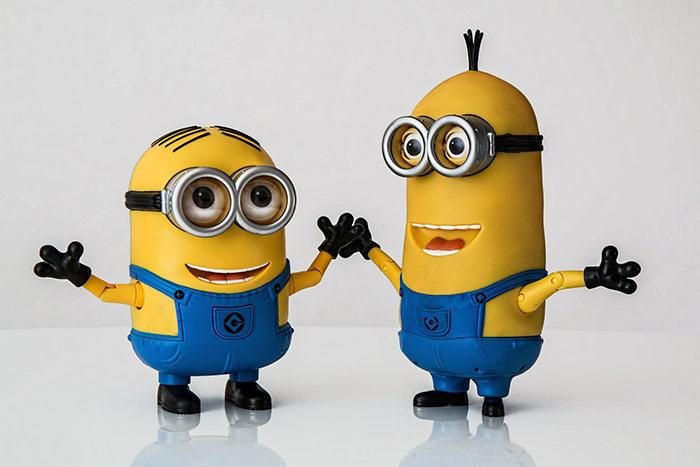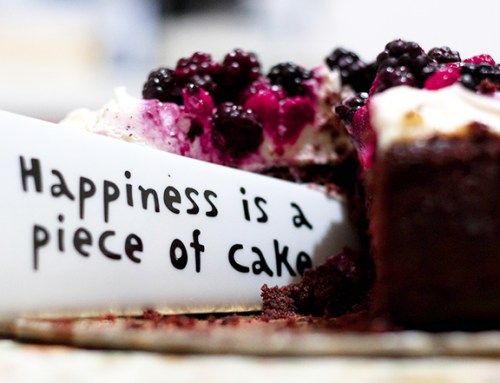In our previous blog, Gustaaf shared his story on how he came up with the idea of handing out stickers to improve his own happiness, and that of others. This blogpost provides you with even more in-depth information, written by Assistant Trainer and Designer Cheron, about our great rewarding system and how and why she co-created our very own Power2Improve ‘Good for You!’ stickers.
Do you remember, in primary school, when you got a 100 percent in your spelling test, you got those bright coloured, and maybe even glittery stickers? They told you: ‘Well Done!’ or ‘You’re A Star!’ At Power2Improve, we brought back these ‘Well Done!’ stickers and we discovered that happiness can easily be increased for adults too. These small circles of joy made and still make me ecstatic, however I remember, at times I often did not qualify for these little gifts. My homework about the coral reef and my English writing skills weren’t quite good enough, even though I put so much effort into it. I felt my hard work was still deserving of some kind of reward. Afterall, I still learned a lot! So, I went out with my parents and bought my own. Rewarding myself for good work. Only if I did deserve it, only if I knew I was learning and growing. My teacher was confused at first, but after my explanation, she smiled.
Stimulating to grow
That flashback made me realize my stickers were of a different kind. They did not just celebrate productivity and results, they gently and warmly invited me to grow.
Growth is an important aspect not only for children back in primary school, but also for adults. At Power2Improve, when we see a colleague doing something good, we compliment. When we see a colleague fail forward, we cheer, support and help. What nicer way to do the latter than by means of special stickers, that recognize the effort, courage and growth shown? Just like the ones I gave myself when I was younger.
Now the question is, will giving colleagues ‘recognition’ stickers, similar to the ones I used to give myself work and help them grow? In fact, we see that these ‘Well Done!’ stickers are effective at stimulating our productivity every day. So can the other kind also be effective in helping us develop ourselves and our happiness? And, important to serious grown ups: would it improve our productivity in the long run?
Introducing ‘Good For You!’ Stickers
To test this out, we at Power2Improve, decided to add this other type of stickers to the ‘Nerd’ or ‘Well Done!’ ones. We baptised them: ‘Good For You!’ stickers. As we found there were no such stickers out there, we co-created them ourselves. My colleagues and I were very excited about this. We were getting the opportunity to come up with creative things we would like to be recognized for. It made us feel very energized! And when they were done, our inner child was happy and we couldn’t wait to go to work to receive them!

‘Good for you!’ stickers © Power2Improve 2016
These inspiring ‘Good For You!’ stickers are awarded to team members that do something meaningful, for themselves, for others or for the company as a whole. They are mini gifts of gratitude, that show appreciation and support our colleagues, both as a co-worker and as a human being.
So what wins our teamies these stickers? For example:
Reading the list may make you think: ‘Those things are simple and easy. Why reward that at all?’ They may be simple, but they are not necessarily easy. Besides, even if you, or I, think something is easy, it may still be quite hard for others. Wouldn’t you like some encouragement and recognition when you struggle to do something you find challenging?
Sigh of relief
You’d be surprised how much receiving a small sticker at the right time can influence a colleague and their productivity that day! For example, last week, a colleague of ours was having a hard time finishing a big task. ‘I don’t usually ask for help, but this time I really needed it. It was a big step for me and it was positively acknowledged by the team. It was a sigh of relief and now I’m more confident to ask for help from colleagues when I need it. In the end I realized that my request for help actually made our whole team more productive. When I get stuck, asking others for support can help me, and the rest of the team, move forward.’
Another colleague experienced something similar, for a more personal matter: ‘I was having terrible back pain and it was really affecting how I worked. I really wanted to take the day off to rest, so that I could be more effective tomorrow, instead of even less. I expressed this and my colleagues acknowledged it in a positive manner. They even gave me tips to help relieve the pain. It was great to be supported! Because of that, I feel more comfortable now taking time off when necessary to take care of my body and well-being.’

Why we are never too busy to hand out stickers
A lot of managers underestimate the power of appreciation and acknowledgement at work. We have seen that way too often. ‘I’m too busy’, they say, or: ‘It’s simply what my subordinates have to do to earn their salary, so why should I compliment them for that?’ They probably are unaware that research by Margaret Greenberg and Senia Maymin shows providing recognition and appreciation can improve productivity by the impressive number of 30 percent! Stickers are one of the simplest ways to do this, at negligible cost.
Teresa Amabile, Professor of Business Administration at Harvard Business School and author of ‘The Progress Principle’, stresses that the single most important aspect that can boost motivation, perceptions and emotions at work, is making progress in activities that are meaningful to you as a person. Next to this, the more frequently you experience this sense of progress, the more likely you are to be creatively productive, especially in the long run. That’s why the stickers I did receive for my spelling test, worked so well: we received them every week and therefore could feel the progress we were making, on a weekly basis. The variety in the ‘Good for You!’ stickers allow us to frequently acknowledge colleagues in more than one aspect. They can get acknowledged for not only doing a good job, but also for something more meaningful to themselves like taking care of themselves, or making healthy choices. The variety of recognitions enables colleagues to feel progress and therefore, grow and develop themselves both professionally and personally.
Learn more about the progress principle and get tips about it here.
Happy stickering for a common goal
Yes, simple stickers still help the, now adult, child, grow and understand that others respect and encourage them to move forward. Simple stickers are nourishers, actions that create a positive work environment and therefore influence the inner work lives and progress of your colleagues, and yourself.
When you think deeper about what Margaret Greenberg, Senia Maymin and Teresa Amabile teach us, stickers are a very simple way of encouraging productivity and growth. It reminds you and your colleagues you all work towards a shared goal. Supporting each other in small ways helps everyone in the long run. Including your customers, who benefit from what you produce. Stickers are just a fun way to approach it. So, go ahead: next time your colleagues are doing a good job, reward them with a nice compliment or give them a cool, heartwarming sticker, and see what happens to the working atmosphere and productivity at your workplace!

 Happy, High Performance Teaming
Happy, High Performance Teaming





Leave A Comment